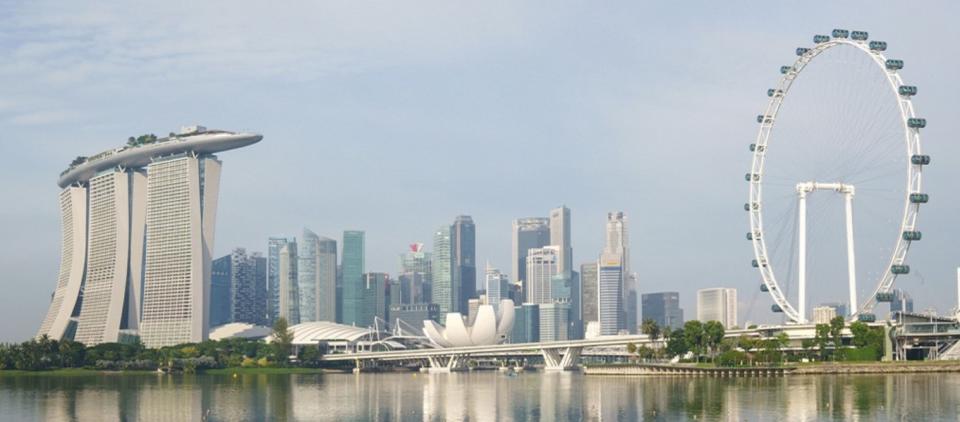
Office rents could also stagnate in 2024, with some downside risks in the second half of 2024, says analyst Ken Foong.
According to Ken Foong, an analyst at Bloomberg Intelligence, property prices in Singapore could remain relatively stable in 2024.
As a result of the cooling measures introduced in recent years, private real estate prices rose by 1.4% quarter-on-quarter in the first quarter of 2024, a slowdown from the 2.8% increase in the fourth quarter of 2023, he notes.
The latest cooling-off measures were announced in April 2023. The changes resulted in Singapore citizens having to pay an additional buyer stamp duty (ABSD) of 20% from April 27, 2023, up from 17% at the time.
For foreign buyers, ABSD doubled from 30% to 60%.
Foong believes that while demand is still supported by residential real estate, which is seen as a hedge against inflation, price growth could be held back by uncertain macroeconomic conditions and interest rates, which currently appear to be remaining high for an extended period.
“Buyers are also more selective when it comes to purchasing a home,” he notes.
On the rental market, apartment rents could fall by 5% in the second half of 2024 and fall by 5-10% for the full year. In his presentation, Foong attributes this to the higher vacancy rates the market has experienced so far.
Over the past six months, house rents have fallen by 4%, but only after a 57% increase compared to pre-pandemic times.
Foong believes that rents may remain under pressure as more homes come onto the market. He adds that new home completions in 2023 have doubled compared to last year. Upcoming new home completions would amount to about 8,000 to 9,000 units, he adds.
With interest rates stabilising in Singapore and the narrowing of the gap between rental yield and mortgage rates, both currently at 3%, landlords may feel less pressure to increase rents to pay their mortgage loans, says Foong.
Office rents
Office rents could also stagnate in 2024, although there are certain downside risks in the second half of the year, the analyst notes.
In Q1 2024, prime office rents in the central business district (CBD) increased by 0.4% to $11.95 per square foot, making it the highest in Q1 2024.th Growth quarter in a row.
However, given the impending supply of office space in the region and macroeconomic headwinds, Foong believes office rents could potentially decline by as much as 2% in the second half of 2024.
“We note that there is a growing supply, IOI Central Boulevard, which reached its first phase of temporary building permit (TOP) in April. It is expected to reach its full TOP by September. With this increase in supply, vacancy rates would increase and put pressure on rents,” says Foong.
“However, we believe that broad-based demand for offices would help IOI Central Boulevard gradually fill the spaces. Moreover, it is the only major supply (coming to market) in the central CBD area until 2025,” he adds.
Retail space
In the retail sector, mall rents are likely to see “mild” growth this year amid high occupancy, Foong says.
“We believe retail sales could grow by a low single-digit percentage this year, supported by stable household incomes and employment conditions in Singapore, partly also by the higher cost of living. So far, we have seen retail sales increase by 0.8% in the first four months,” he notes.
While future shopping centre supply is expected to grow at a compound annual growth rate (CAGR) of 0.6% from 2023 to 2027, below the historical average of 1.5% between 2011 and 2019, Foong expects a large proportion of the new supply to be located in residential areas and integrated developments.
He believes that demand will gradually “absorb” this new supply.
Hospitality
Revenue per available room (RevPAR) of Singapore hotels could increase by 10 to 15 percent due to the recovery of tourism.
Growth factors contributing to potentially higher RevPAR include more meetings, incentives, conferences and exhibitions (MICE) and more events, such as the recent spate of concerts that took place earlier this year, according to Foong.
The introduction of visa-free travel between Singapore and China and more dynamic offers could drive up hotel rental prices.
“We think visitor growth could reach the upper limit of the 10 to 21 percent forecast by the Singapore Tourism Board (STB),” says Foong, adding that visitor numbers to Singapore have already increased by 41 percent in the first four months of the year, partly due to the Taylor Swift concerts in March.
Data centers
Demand for data centers could increase due to current trends such as generative artificial intelligence (AI), digitalization, cloud deployment and 5G.
“Our technology analysts predict that AI generation revenues could grow by an average of 41% annually from 2023 to 2032. Based on International Data Corporation (IDC) forecasts, cloud spending is expected to grow by 19.5% annually from 2023 to 2028,” says Foong.
Among the REITs listed in Singapore with exposure to data centers, the analyst prefers the CapitaLand Ascendas REIT A17u for its diversified portfolio. Another REIT that has a somewhat diversified portfolio compared to its peers is Mapletree Industrial Trust Me8u (STEM), he adds.
While Keppel DC REIT also has a more diversified portfolio compared to Digital Core REIT and the majority of its revenue comes from its top 10 tenants, the former currently has an overhang from its data centers in Guangdong in China. It will take some time to resolve the issue, the analyst notes.
See also:

